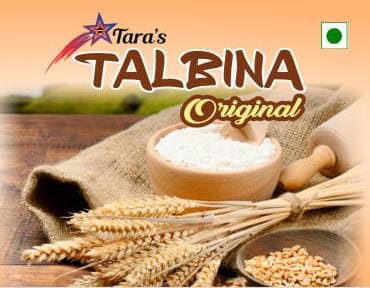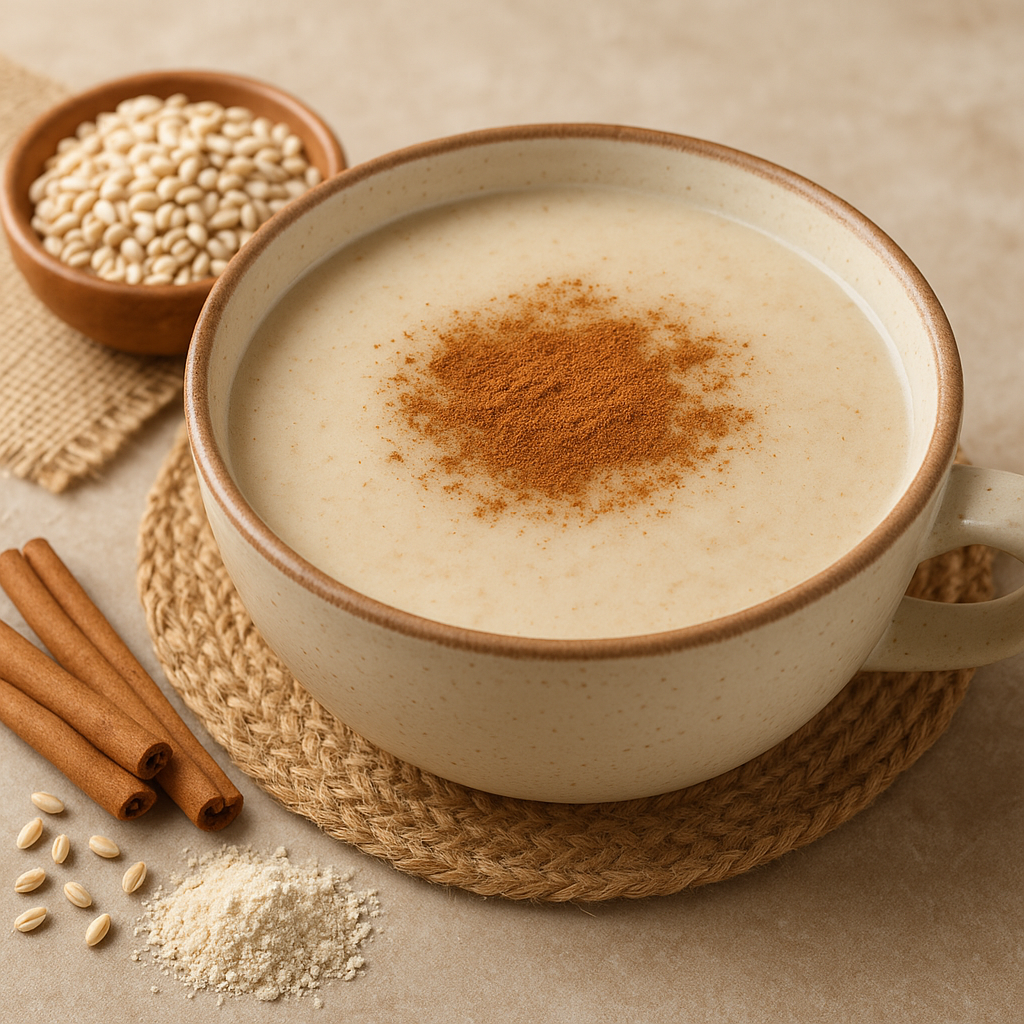
How to Improve Gut Health Naturally?
Gut health plays a crucial role in your overall well-being. From your immune system to your mood and even your skin — it all starts in the gut. If you’re constantly feeling bloated, low on energy, or struggling with digestion, it might be time to show your gut some love. The good news? You don’t need expensive supplements or medications. You can improve gut health naturally, starting today.
Let’s break down everything you need to know.
A Journey, Not a Destination
Improving your gut health naturally is a marathon, not a sprint. The key is consistency. Instead of trying to overhaul your entire life overnight, start with one or two small, manageable changes. Perhaps you can add a serving of yogurt to your breakfast or make a conscious effort to manage stress with a five-minute breathing exercise.
By focusing on these foundational pillars—probiotics, prebiotics, dietary diversity, stress management, and sleep—you are giving your body the tools it needs to build a resilient and thriving gut microbiome. And when your gut is happy, the rest of your body will thank you for it.

Why Is Gut Health So Important?
Think of your gut as your body’s command center. It doesn’t just digest food — it controls inflammation, produces essential vitamins, manages hormones, and even communicates with your brain. A healthy gut means:
Better digestion
Stronger immunity
Improved mood and mental clarity
Clearer skin
Reduced risk of chronic disease
On the flip side, a damaged gut can lead to food intolerances, autoimmune issues, fatigue, and even anxiety or depression.
It’s all about your gut microbiome—a bustling community of trillions of microorganisms living in your digestive tract. Think of it as a complex internal ecosystem. When it’s balanced, you thrive. When it’s out of whack, you feel it.
Fortunately, you have significant power to influence this ecosystem for the better. Forget extreme diets or miracle pills; improving your gut health naturally is about making smart, consistent choices. So, let’s dive into the science-backed strategies you can start using today.
Load Up on Probiotics: Your Gut's Best Friends
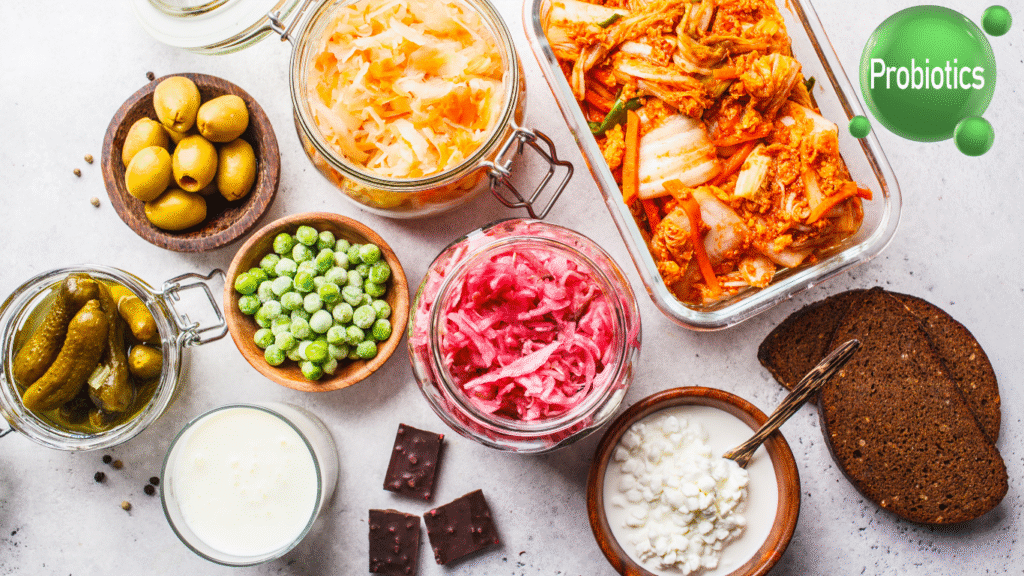
First things first, let’s talk about the “good guys.” Probiotics are live, beneficial bacteria that help restore balance to your gut microbiome. Adding them to your diet is like sending in reinforcements to support your internal army. They work by crowding out harmful bacteria and contributing to a healthy, diverse gut environment.
You can easily find probiotics in fermented foods. For a powerful dose, try incorporating these into your meals:
- Yogurt: Look for brands with “live and active cultures.”
- Kefir: A fermented milk drink that often contains more diverse bacterial strains than yogurt.
- Sauerkraut: Choose the refrigerated kind, as shelf-stable versions are pasteurized, which kills the beneficial bacteria.
- Kimchi: A spicy, fermented Korean staple made from cabbage and other vegetables.
- Kombucha: A fizzy, fermented tea. Just be mindful of the sugar content.
Fuel Up with Prebiotics: The Food for Your Good Bacteria
Now that you’ve invited the good bacteria to the party, you need to feed them. That’s where prebiotics come in. Prebiotics are specific types of dietary fiber that your body can’t digest. Instead, they travel to your lower digestive tract, where they act as a food source for your healthy gut bacteria.
Essentially, feeding your gut prebiotics helps your probiotics flourish. You can boost your prebiotic intake by eating more fiber-rich plant foods, such as:
- Garlic and Onions
- Asparagus
- Bananas (especially when they’re slightly green)
- Oats and Barley
- Apples
- Flaxseeds
Making these foods a regular part of your diet provides the essential fuel your microbiome needs to thrive.
(Reference: Mayo Clinic. (2021). Prebiotics, probiotics and your health.
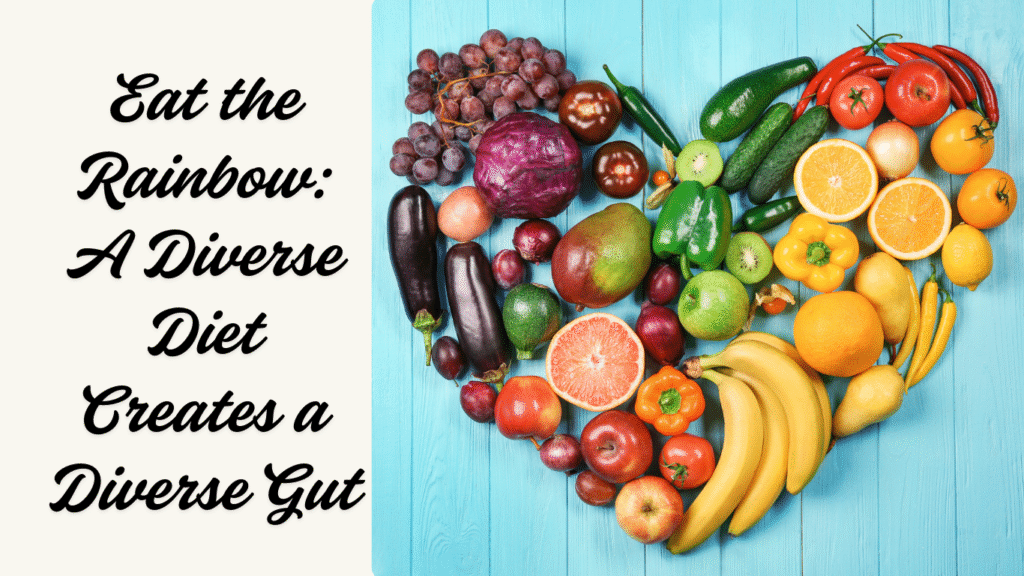
Eat the Rainbow: A Diverse Diet Creates a Diverse Gut
A simple rule of thumb is to “eat the rainbow.” Aim to include foods of different colors on your plate throughout the week. This naturally ensures you’re getting a broad spectrum of nutrients and fibers. For instance, a diet that includes blueberries, spinach, red bell peppers, and sweet potatoes will support a much healthier gut than a diet that relies on just a few staple foods.
Manage Your Stress: The Gut-Brain Connection is Real
Have you ever felt “butterflies” in your stomach when you were nervous? That’s the gut-brain axis in action. Your brain and your gut are in constant communication via a network of nerves, primarily the vagus nerve. Chronic stress can negatively impact this communication, leading to changes in gut motility, secretions, and even the composition of your microbiome.
Furthermore, stress can increase intestinal permeability (often called “leaky gut”), which allows bacteria and toxins to pass into the bloodstream, triggering inflammation. To support your gut, you must also support your mind. Consider integrating stress-management techniques into your routine:
- Meditation or mindfulness apps
- Deep breathing exercises
- Yoga or gentle stretching
- Spending time in nature
(Reference: Johns Hopkins Medicine. (n.d.). The Brain-Gut Connection.

Prioritize Quality Sleep: Your Gut's Nightly Reset
A good night’s sleep does more than just recharge your brain; it also helps regulate your gut. Your gut microbes, like you, have a circadian rhythm. Poor or insufficient sleep can disrupt this rhythm, leading to an imbalance in your microbiome. Studies have shown that even short-term sleep deprivation can alter gut bacteria for the worse.
Aim for 7-9 hours of quality, uninterrupted sleep per night. This allows your body, including your digestive system, the time it needs to rest, repair, and maintain a healthy microbial balance.
How to Improve Gut Health Naturally
Improving gut health naturally is easier than you think — it’s about small, consistent choices. Let’s explore the most effective and science-backed strategies.
1. Eat More Fiber-Rich Foods
Fiber is the fuel your gut bacteria thrive on. It helps move waste through your digestive system and keeps things running smoothly.
Best sources of fiber include:
Whole grains like oats and barley
Fruits like apples, bananas, and berries
Vegetables like broccoli, spinach, and carrots
Legumes such as lentils, chickpeas, and beans
Quick Tip: Start slow. If you suddenly eat too much fiber, it may lead to bloating. Gradually increase your intake and drink more water.
2. Boost Your Gut Health Naturally: Add Fermented and Probiotic-Rich Foods to Your Daily Diet
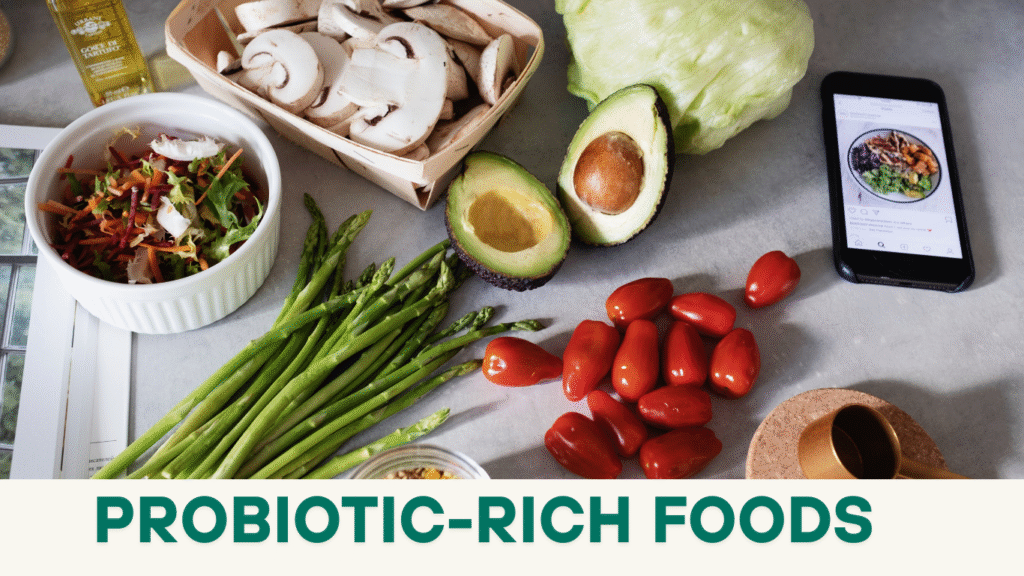
Fermented foods are rich in probiotics — the good bacteria your gut needs.
Include in your diet:
Yogurt (with live cultures)
Kefir
Sauerkraut
Kimchi
Pickles (naturally fermented)
Miso
Kombucha
These help restore balance in your gut flora and fight off harmful bacteria.
3. Limit Processed Foods and Sugar
Highly processed foods and refined sugars feed the “bad” bacteria in your gut. Over time, this leads to an unhealthy imbalance, inflammation, and gut damage.
Simple swaps:
Replace soda with infused water or herbal teas
Snack on nuts or fruit instead of chips
Cook at home instead of ordering out
Too much sugar, especially from processed and ultra-processed foods, can cause gut inflammation and disrupt the balance of your microbiota. Refined sugar feeds harmful bacteria and yeast, such as Candida albicans, contributing to bloating, fatigue, and other digestive issues.
Research published by Frontiers in Microbiology revealed that Western diets high in sugar and fat are linked to reduced microbial diversity and compromised gut lining integrity (Source: Frontiers).
🥤 Take Action: Reduce intake of sugary beverages, packaged snacks, and artificial sweeteners to bring balance back to your gut.
4. Stay Hydrated
Water helps break down food, absorb nutrients, and keep your digestive system working properly. Dehydration can slow down digestion and cause constipation.
Aim for at least 8–10 glasses of water per day.
Bonus: Add lemon or mint to your water for digestive support.
Water plays a vital role in maintaining gut health. It supports nutrient absorption, promotes regular bowel movements, and helps your gut lining stay strong. Dehydration can slow digestion, leading to constipation and bacterial imbalance.
A 2020 study published by the Journal of Nutritional Biochemistry found that hydration levels were directly tied to microbial richness and diversity (Source: ScienceDirect).
💧 Health Tip: Drink when you’re thirsty, and monitor your urine color—it should be light yellow.

5. Manage Your Stress Levels
Your brain and gut are deeply connected. High stress can disturb your gut bacteria and lead to digestive problems.
Try this:
Practice deep breathing
Journal your thoughts
Exercise regularly
Meditate, even for just 5 minutes a day
Get enough sleep (7–9 hours)
Physical activity isn’t just good for your heart and muscles—it’s also great for your gut. Multiple studies have shown that regular aerobic exercise can change the composition of your microbiome for the better.
A 2019 clinical trial published in Gut Microbes journal found that participants who exercised regularly had higher levels of short-chain fatty acids (SCFAs)—beneficial compounds produced by gut bacteria that support colon health and reduce inflammation (Source: Taylor & Francis Online).
🏃 Goal: Aim for 150 minutes of moderate exercise per week, as recommended by the CDC.
Chronic stress impacts your gut through the gut-brain axis, a two-way communication system between your gut and brain. Stress can disturb gut motility and increase inflammation.
A recent report in Nature Reviews Gastroenterology & Hepatology confirms that psychological stress decreases good bacteria and enhances the growth of harmful strains (Source: Nature).
🧘 Wellness Tip: Try meditation, deep breathing, yoga, or even a leisurely walk to calm your nerves. Consistency is key.
6. Get Quality Sleep & Improve Sleep Hygiene
Your gut works hard while you sleep. A lack of rest throws off the balance of your gut bacteria, weakens immunity, and increases cravings for unhealthy foods.
Quick Fix: Set a consistent bedtime routine. Limit screen time an hour before bed and try to sleep at the same time every night.
Poor sleep may weaken your gut and immune system. A 2017 study found that just 48 hours of sleep deprivation can alter the gut microbiome, reducing bacteria that produce anti-inflammatory compounds (Source: Molecular Psychiatry – Nature).
🛏️ Pro Tip: Stick to a regular bedtime, keep your bedroom cool and dark, and avoid screens at least one hour before sleep. Adults should aim for 7–9 hours of uninterrupted sleep nightly according to Sleep Foundation guidelines.
7. Move Your Body
Exercise doesn’t just build muscles — it boosts gut health too. It increases microbial diversity and improves digestion.
Try to move daily:
Brisk walk
Yoga or stretching
Dancing
Strength training
Just 30 minutes a day can make a big difference.
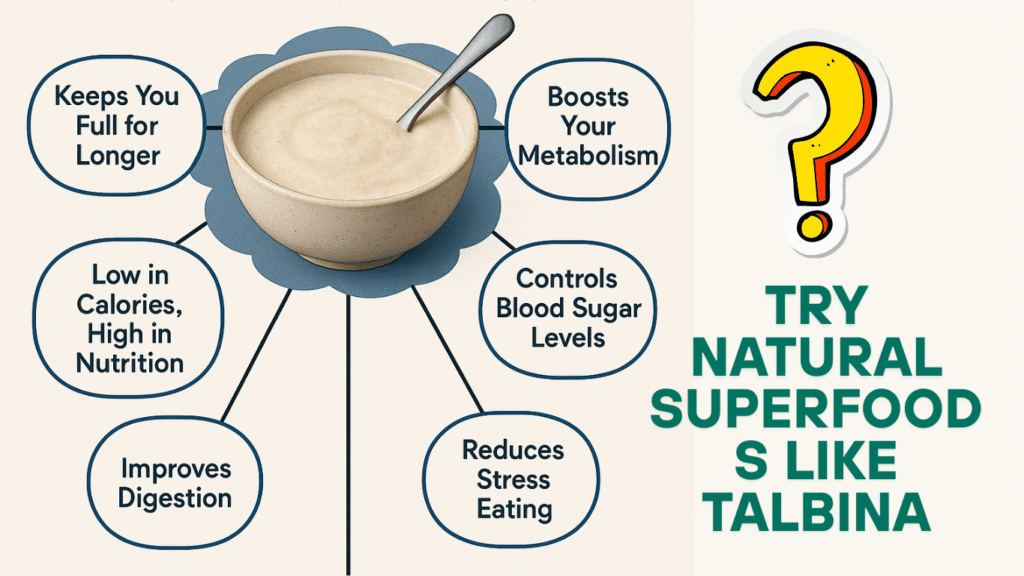
Now, let’s talk about one of the most underrated natural gut healers — Talbina.
What is Talbina?
Talbina is a traditional Sunnah food made from barley and milk (often with honey). It was recommended by Prophet Muhammad ﷺ for healing and comfort. It’s soothing, highly nutritious, and gut-friendly.
How does Talbina help gut health?
Rich in soluble fiber: Supports bowel regularity and feeds healthy gut bacteria
Eases digestion: Its soft, porridge-like texture is gentle on the stomach
Reduces inflammation: Barley contains beta-glucans that calm the gut lining
Boosts mood: As a Sunnah food, it’s known to bring emotional comfort and physical strength
How to enjoy Talbina?
As a warm breakfast with honey and dates
Mix in cinnamon or crushed nuts for added flavor
Use plant-based milk if you’re dairy-sensitive
Talbina is not just food; it’s Natural medicine in a bowl.
9. Listen to Your Body
Everyone’s gut is unique. Some people feel better on a plant-based diet, while others thrive with balanced meals including meat and grains. Track what works for you.
Keep a food journal to notice patterns:
Which foods energize you?
What causes bloating or discomfort?
How do you feel after certain meals?
Tuning into your body is the most powerful natural tool you have.
Avoid Unnecessary Antibiotics
Antibiotics can be lifesaving, but overuse kills not only harmful bacteria—it wipes out good ones too. This can lead to a disrupted gut microbiome, known as dysbiosis, which often takes months to recover from.
According to the CDC, at least one-third of antibiotic prescriptions in the U.S. are unnecessary, raising a red flag for gut health (Source: CDC Antibiotic Use).
💊 When You Need Them: Always discuss alternatives with your healthcare provider and ask if antibiotics are truly necessary.
Bonus: Gut-Friendly Habits to Add Today
Chew your food slowly
Avoid eating late at night
Cut back on antibiotics unless necessary
Spend time in nature (it helps your microbiome!)
Hug people — oxytocin reduces stress and supports gut health

Final Thoughts: Small Changes, Big Impact
Supporting your gut might sound complex, but most solutions are refreshingly simple. By eating more whole plant foods, moving your body, managing stress, and keeping your sleep in check, you’ll create an environment where your microbiome can thrive.
The payoff? Better digestion, clearer skin, stronger immunity—and who knows, maybe even a better mood. Always consult your doctor or a registered dietitian before making significant changes to your diet or lifestyle.
If you’re serious about learning how to improve gut health naturally, start with the basics: eat real food, manage stress, hydrate, sleep, and nourish your body with time-tested foods like Talbina.
Improving gut health isn’t about perfection — it’s about progress. With small daily steps, you’ll notice a big change in how you feel, think, and live.


